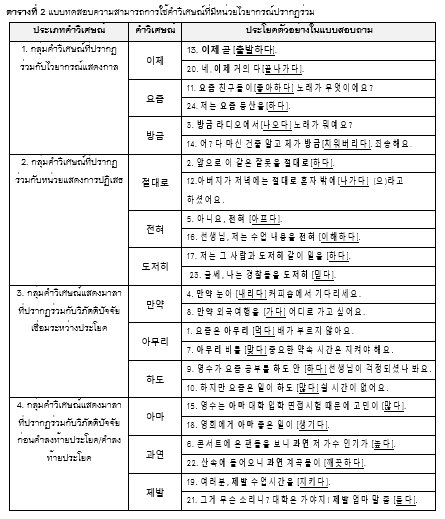A Study of the Use of Korean Concords Adverbs Among Thai Students
Main Article Content
Abstract
The purposes of this research were 1) to compare the ability of intermediate and advanced Thai students of Korean and native Korean speakers in using Korean concord adverbs; and 2) to compare their selection of the concord adverbs. The data were collected using the test administered to 139 Thai students learning Korean and 56 native Korean speakers. The findings were as follows: 1) Thai students and native Korean speakers showed statistically significant differences in all aspects concerning their ability to use Korean concord adverbs; and 2) native Korean speakers were most likely to employ the correct concord adverbs of all types whereas advanced Thai students, compared to the intermediate ones, showed their higher ability in using Korean concord adverbs, which was considered much closer to the level of the native speakers.The findings indicated two problems concerning the use of concord adverbs experienced by Thai students: 1) they were able to select the correct Korean concord adverbs but failed to employ them in the conversations, which resulted in the differences their responses and Korean native speakers’; and 2) they were unable to use grammatical structures collocating with the adverbs. Factors affecting Thai students’ use of some grammatical structures that did not collocate with the selected adverbs included the different grammatical structures conveying the same meanings in Korean, which might lead to the students’ confusion, and the interference of Thai students’ first language in the use of Korean adverbs. Studying the contents separately was another factor leading to Thai students’ inability to perceive the relationship between grammatical structures and concord adverbs in Korean.
Downloads
Article Details

This work is licensed under a Creative Commons Attribution-NonCommercial-NoDerivatives 4.0 International License.
The articles published are copyrighted by the Graduate School, Chiang Mai Rajabhat University.
The opinions expressed in each article of this academic journal are solely those of the individual authors and do not reflect the views of Chiang Mai Rajabhat University or its faculty members. The responsibility for the content of each article rests entirely with the respective authors. In the event of any errors, the authors alone are responsible for their own articles.
References
Choi, H. Y. (2014). A study of acquisition of concord adverbs by Chinese learners of Korean. (Master’s thesis, Ewha Womans University).
Dursun, E. (2014). Research on the education of Korean modal adverbs for Turkish learners. (Master’s thesis, Seoul National University).
Hee, R. C. (2004). An analysis of concord adverbial construction: Downward unbounded discontinuities and indexed phrase structure grammar. The Linguistic Society of Korea, (38), 183-225.
Kim, K. H. (1996). A study on adverbials in present-day Korean. (Doctoral’s thesis, Seoul National University).
Ladnuy, K. (2013). A study on teaching method of Korean adverb of degree’s synonyms for Thai Learners. (Master’s thesis, Sookmyung Woman's University).
Lewis, M. Ed. (2000). Teaching collocation: Further developments in the Lexical Approach. Oxford: Oxford University Press.
Li, X. (2010). Research on the education of Korean modal adverbs for Chinese learners. (Master’s thesis, Seoul National University).
Mallikamas, P. (2003). The role of collocation in the development of English language skills. Pasaa Paritat Journal, (20), 62-76. [In Thai]
National Institute of the Korean Language. (2011). Research on Korean Language Education Vocabulary Content Development (Stage 2). Retrieved from https://www.korean.go.kr
Park, Y. (2018). The Effect of proficiency, residence period, and exposure time on Thai learners' understanding of Korean irony expressions. (Master’s thesis, Ewha Womans University).
Sanguansin, S. (2018). A study on the acquisition of ‘-get-’ and ‘-(eu)l geosi-’ of Thai learners of Korean. (Master’s thesis, Ewha Womans University).
Yiping, P. (2017). A study on teaching and learning conjecture modality adverbs for Chinese learners. (Master’s thesis, Seoul National University).
Yong, J. C. & Talaeyeon. (2016). Second language acquisition of Korean concord adverbs by adult Chinese speakers. Urimalgeul, (69), 121-153.
Yuan, W. (2020). A study on Korean modal adverbs education for Chinese learners. (Master’s thesis, Inha University).
Yun, J. H. (2016). A study on use aspect of Korean concord adverbs by Chinese Korean learners: based on learner’s composition. (Master’s thesis, Dongguk University).


